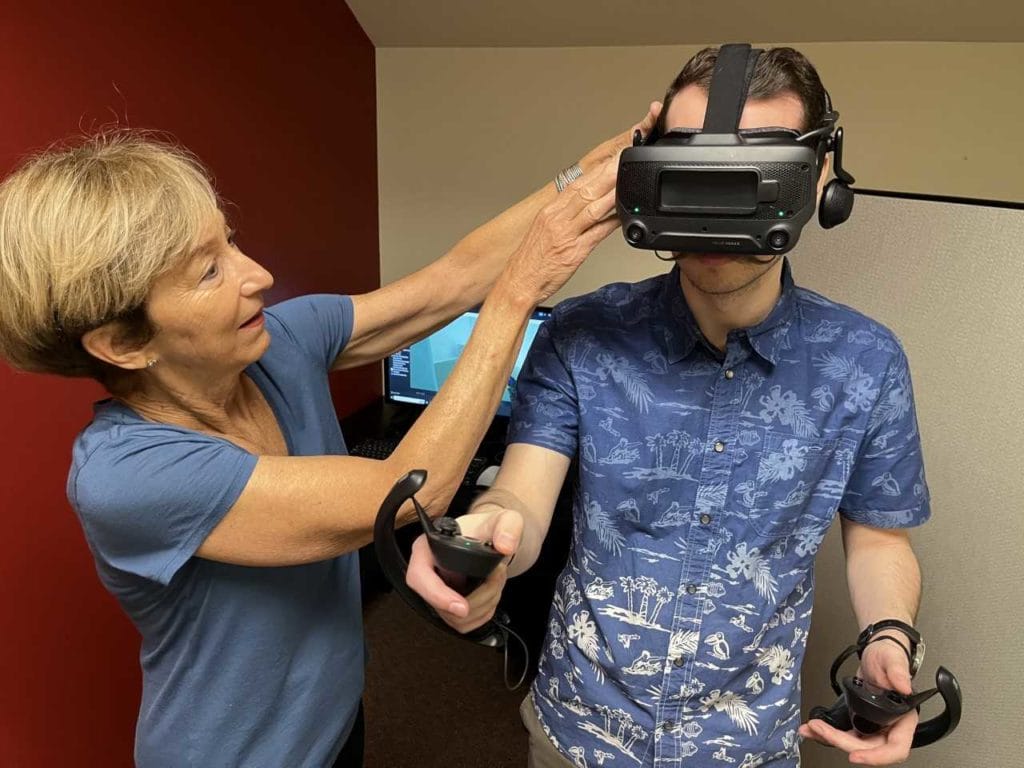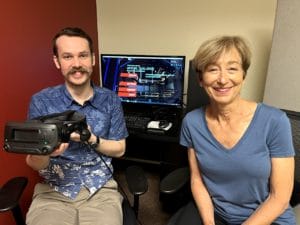Using Virtual Reality to Shed Light on the Provocative Subject of Police Body-Worn Cameras

On a weekday afternoon this summer, Psychology Professor Kathy Pezdek was standing in a small office in the Advanced Computing Building at CGU watching Tyler Shapland, one of her doctoral students, play a video game.
On the screen was Espire 1: VR Operative, a first-person stealth shooter game. Equipped in the latest VR equipment like a typical gamer, Shapland demonstrated how to play the game, which forms the centerpiece of important research on the issue of memory and law enforcement officers in the field.
VR has been touted—thanks to the rise of companies like Meta—as opening up whole new worlds of experience, and that’s especially true for a cognitive psychologist like Pezdek. This technology has provided her with another powerful tool for approaching the highly provocative subject of police officers and memory—something that’s the subject of several new and forthcoming journal articles that she’s authored, including one co-authored with Reed College’s Daniel Reisberg.
Critical issues arise as more technology
is used by law enforcement.
Pezdek’s also the co-author with Shapland and another CGU student, Jessica Barragan, of a recent paper in Journal of Applied Research in Memory and Cognition on that very same topic. The paper arose out of a five-year-long project (funded by the National Science Foundation) to study the impact of technology on police officers. More specifically, in that program of research, she, Shapland, and Barragan look closely at the hotly-debated question of whether or not police should review body cam footage before filling out their incident reports.
Very little work has been done in this area. Pezdek said she’s not surprised.
“Body cam footage is relatively new, and its widespread implementation is very new,” said Pezdek, who authored the chapter on Body-Worn Cameras in the 2022 edition of Advances in Psychology and Law. “Today most officers are wearing body cams almost all of the time. For many people it makes sense for officers to review this footage before filling out any reports, especially for use of force incidents. The footage can help them fill in pieces of an incident and polish the story. That seems reasonable … unless you’re someone like me, who studies memory and how the mind works.”
What the camera lens records and what a police officer remembers about an incident can be vastly different—and that’s not a bad thing.
In fact, for Pezdek this difference can be immensely helpful in explaining—and defending—an officer’s actions at the time of an incident, especially one involving use of force.
Pezdek’s not the only one who believes that such differences matter and shouldn’t be ignored. She points to a 1989 U.S. Supreme Court case, Graham v. Connor, which anticipated by many years what Pezdek is now tackling with Shapland and the rest of her team.
“According to that case, it’s important to know an officer’s original perception of an event at the time it occurred, not their perception as it’s been altered by hindsight and potentially contaminating information,” Pezdek said. “Today that phrase ‘contaminating information’ can mean things like video and body cams, which is why the work we’re doing is so important.”
Myths, Memories & Body Cams
The life of a law enforcement officer has grown increasingly difficult in recent years. That is undeniable. According to a report last year on Georgia Public Radio, since the pandemic began, “for law enforcement across the country, 2020 brought a set of compounding and shifting pressures” that haven’t abated more than two years later. Today officers are under incredible scrutiny, especially from bystanders who are able to record their every movement with a smartphone.
That has put increasing pressure on officers to file incident reports that don’t include any ambiguities, contradictory information, or anything else that could be problematic. And the use of body cams—as well as dash cams in their cars—has been heralded as a significant improvement in helping them with this work.
But Pezdek’s research cautions against the influence of body cams on such reports.
“Memory is an imperfect process. Cognitive scientists know that,” she explained. “If an officer’s report exactly matches what we see on their video, I’d be suspicious. That’s because they shouldn’t match. Perception and memory aren’t that precise, especially in high-stress situations.”
“Some people consider my research to be
anti-police,” Pezdek says.
“I’m one of the strongest advocates
for the police.”
Now in her fifth year of research on this subject with her students, Pezdek said in addition to their work on campus with virtual reality games, their research has involved working with some 120 officers in the L.A. area.
In this research, the officers participated in two scenarios in a shooting simulator at the police department training center, while Pezdek and her team record these game sessions using video. Later, each officer was asked to describe what happened during each session of the game, but here’s the catch: They were only allowed to watch the video for one of the scenarios.
As one might expect, the video-assisted account and the memory-only account show important differences.
” There’s a real inconsistency,” she said, “and often, when the officers are using information from the video, the video gets morphed into what they remembered from the incident.”

Helping Law Enforcement Explain Their Actions
It’s reasonable (and completely understandable) that using body cams is a way to capture important objective information about an incident, especially one involving use of force.
“I work with police all the time,” Pezdek said. “The stakes are very high for them, and if they make a mistake in their reports, the consequences can be significant.”
But the camera doesn’t capture something that Pezdek says is critical—the emotional-psychological state of the officer at the time of the incident.
Which is why she argues that officers shouldn’t use body cam video to fill out their reports because it will affect and distort their memories and prevent our understanding of their mindset at the time.
Why is that a bad thing? Consider this scenario.
An officer encounters a suspect on a dark street. The suspect pulls something from their pocket and the officer responds by pulling his or her firearm.
In his report, the officer states that he believed the suspect had a gun and was going to shoot him. The body cam shows that the suspect was holding their smartphone, not a gun.
But the officer may not have known that at the time, Pezdek would say. The officer likely perceived it was a gun and responded accordingly. Someone may argue later that the officer had no right to pull a firearm on an unarmed citizen, but an incident report that shows us what the officer felt and remembered at the time versus what a bodycam actually shows offers a way to explain his or her actions.
“Some people consider my research to be anti-police. I don’t see that at all,” she said. “I’m one of the strongest advocates for the police. It’s their state of mind at the time that justifies how they acted, and that is what needs to be protected from contamination. I think that’s really important, and more research needs to be done to explore this.”
Cognitive Science at CGU
Pezdek is proud of the way that the graduate school’s cognitive psychology program interacts with cognitive psychology faculty members at the other schools of The Claremont Colleges. She says it’s a highly interactive and engaged academic community.
“The cognitive psychology faculty and students work with a number of faculty from the undergrad schools. We have a really collaborative atmosphere that I think is stronger than you find in many other programs,” she said. “We regularly get together for talks and all kinds of other events where we share research findings. We operate the way a scientific community should.”
For Shapland, the opportunity to work closely with a foremost authority on eyewitness memory like Pezdek is one of the reasons that he was attracted to CGU for his doctoral program in the first place.
“Students are working alongside faculty, and that’s really exciting and inspiring,” he said. “I have other friends in other universities who have to wait for this kind of closeup collaboration. But this is something that I experienced at CGU from day one.”
Pezdek said it’s very gratifying collaborating with her doctoral students on research that has real-world implications. It gives students a chance to explore the applied dimension of their disciplines; for Pezdek, it also provides her with a reliable team of researchers trained in rigorous methodologies and who can carry their own weight in the field.
“It’s a very reciprocal relationship,” she said. “CGU is a place where you can take your professional interests out into the world and have immediate applications. At other schools, faculty are mostly content staying in the ivory tower, but I’m particularly interested in doing important research and then applying it. CGU is a place where that’s encouraged, and where we have students who are eager to join in that effort and work with us.”